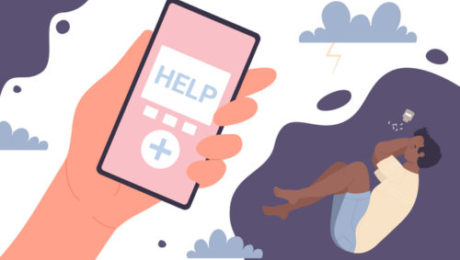New Mental Health Crisis Dialing Code Launched July 16
This article is from RISQ Consulting’s Zywave client portal, a resource available to all RISQ Consulting clients. Please contact your Benefits Consultant or Account Executive for more information or for help setting up your own login.
The 988 Suicide and Crisis Lifeline (Lifeline) launched nationwide on July 16. Similar to dialing 911 for medical emergencies, people in emotional distress or suicidal crisis can call or text 988 and be connected immediately to trained counselors who will listen, provide support and connect them to resources if necessary.
The three-digit dialing code is new, but the Lifeline is not. Previously known as the National Suicide Prevention Lifeline, callers only reached the 24/7 national crisis hotline by dialing 1-800-273-8255 (TALK). The easy-to-remember dialing code (988) is meant to replace that number; however, callers will still be connected to the same services, regardless of which number is used. The Lifeline provides services in both English and Spanish.
“We have a three-digit number for medical emergencies; we need a three-digit number for psychological emergencies—and that’s what this is.”
– John Draper, executive director, Lifeline
The Lifeline
Since 2005, the Lifeline has been a network of roughly 200 crisis centers funded by the U.S. Department of Health and Human Services’ Substance Abuse and Mental Health Services Administration. Since its founding, the Lifeline has received more than 20 million calls from people in distress looking for help when they needed it most. Nearly 2.4 million calls occurred in 2020 alone, illustrating America’s current mental health crisis.
Spreading the Word About 988
Suicide is the second leading cause of death among preteens and adults aged 25 to 34, according to the Centers for Disease Control and Prevention. The Lifeline is a direct connection to compassionate, accessible care for anyone experiencing mental health-related distress, including thoughts of suicide, mental health or substance use crisis, or other emotional struggles. People can also call the Lifeline if they are worried about a loved one who may need emergency support.
Just as Americans know to call 911 in a medical emergency, it’s vital to spread the word about 988 in your own state. This new three-digit dialing code could provide immediate support during someone’s darkest hour.
- Published in Blog
Managing War-Related Anxiety
This article is from RISQ Consulting’s Zywave client portal, a resource available to all RISQ Consulting clients. Please contact your Benefits Consultant or Account Executive for more information or for help setting up your own login.
If you’re worried about the war in Ukraine, you’re not alone. Although it may be your first instinct to think about those caught up in the conflict, it’s completely normal to feel upset or concerned about what you see from afar.
War is terrifying to hear about, and it’s causing a return to a heightened state of anxiety and stress for many. According to the World Health Organization, the global prevalence of anxiety and depression jumped 25% in the first year of the pandemic. With COVID-19 beginning its transition from pandemic to endemic, a sense of relief and a gradual return to normality had begun. However, the war in Ukraine has created further uncertainty, and for many people, it’s taking a toll on their mental well-being.
This article outlines ways to cope with war-related anxiety and support those affected by the war.
How to Cope
Watching a war unfold can make you feel out of control, heightening anxiety and stress. Instead, try to focus on what you can control. Consider the following coping tips:
- Avoid doomscrolling. A University of Florida study has found that doomscrolling—a term used to describe the concept of binging on negative news—is a new and unique behavior. Understandably, you may want to follow news coverage about current events to stay in the loop of what’s happening, but spending too much time doing this can negatively impact your mental health. To combat this unhealthy habit, try to spend less time on social media and focus on facts rather than speculation.
- Be physically active. Try to give your mind a rest, shifting the focus to your body instead. Physical activity creates mood-boosting chemical changes in the brain. Engage in activities such as swimming, cycling, walking and running.
- Be mindful. When thoughts feel spiraling, mindfulness activities may stop your mind from racing. Yoga, meditation, breathing exercises and other mindful practices can help you feel in the present moment.
- Take time to unwind. It’s essential to still engage in activities you enjoy. Creative outlets, such as hobbies, crafts, writing or home improvement, can especially be a good distraction.
- Maintain sleep habits. Although it may be hard to sleep when anxious, try to maintain your usual sleeping pattern. Being well-rested is vital for emotional balance.
- Connect with others. Good relationships foster a sense of belonging and provide an outlet to share experiences. Sharing worries with others can improve your situation and feelings.
Connect with friends and family to bolster your mental well-being. Make plans, such as a family meal or lunch with a close friend or colleague.
Especially amid the current events, it’s essential to focus on what you can control: your thoughts. If you’re concerned about your mental health, reach out to a professional or use the Substance Abuse and Mental Health Services Administration’s (SAMHSA) Disaster Distress Helpline by calling or texting 800-985-5990. SAMHSA’s 24/7 confidential hotline is dedicated to providing immediate crisis counseling for Americans experiencing emotional distress related to any human-caused disaster.
How to Help
It may be harder to cope with war-related anxiety if you’re unsure of how you can help. However, there are many avenues to make an impact. Various charity organizations offer a wide range of support for those affected by the war. Charity Navigator, a nonprofit evaluator, assessed ways to help and recommends the following organizations:
- Direct Relief
- GlobalGiving
- Heart to Heart International
- International Medical Corps
- Project HOPE
- Save the Children
- UNICEF
These charities outline various ways to make a difference, including volunteer opportunities, charitable donations and other activities.
Summary
When anxious and helpless feelings occur, it’s hard to know what to do, but it’s important to focus on what you can control. You are in control of your thoughts and can take steps to protect your mental health.
It’s natural to feel anxious in the wake of destructive international events, but don’t suffer alone. Your employer may offer mental health resources. Additionally, if you’re feeling anxious or concerned about your mental health, talk to your doctor or call or text SAMHSA’s Disaster Distress Helpline at 800-985-5990.
- Published in Blog



